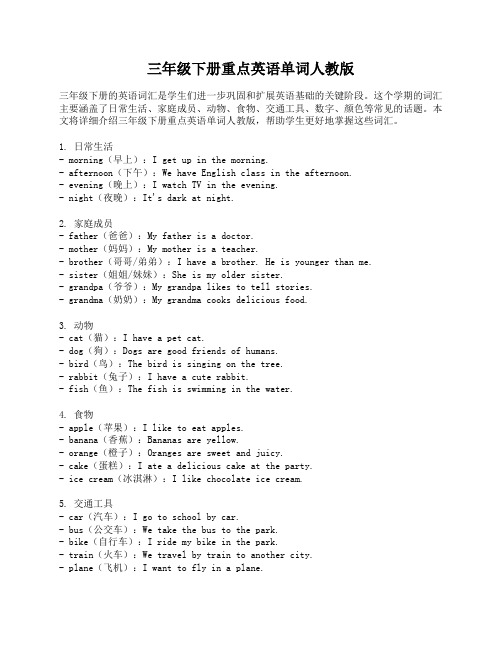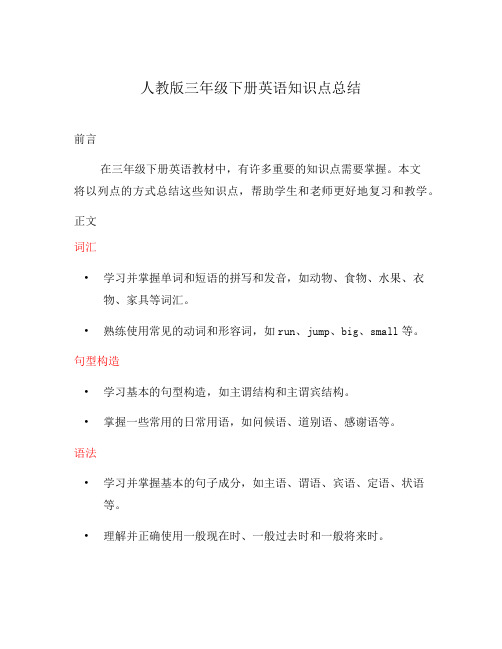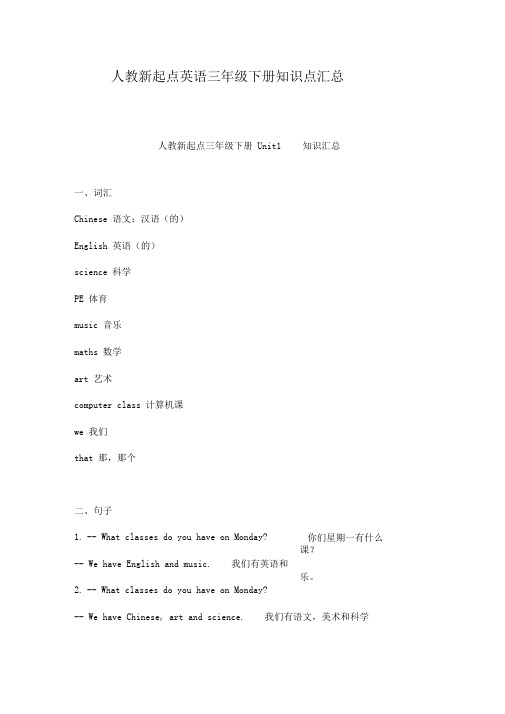人教版(新起点)三年级英语下册知识点汇总
(完整版)人教版小学三年级下册英语知识点归纳

三年级下册知识点一、考考自己:自己能在最短的时间内听听、说说、读读下列单词吗?Unit 1UK(英国)Canada(加拿大)USA(美国)China(中国) she(她)student(学生)pupil(小学生)he(他)teacher (教师)boy(男孩)and(和)girl(女孩)new(新的) friend(朋友)today(今天)Unit 2 |:father(父亲)dad(爸爸)man(男人)woman(女人) mother(母亲) sister(姐、妹) brother(兄、弟)grandmother (祖母) grandma (祖母) grandfather(祖父) grandpa(祖父)family(家庭)Unit 3 |:thin(瘦的)fat(胖的)tall(高的)short(矮的,短的) long(长的)small(小的)big(大的)giraffe(长颈鹿) so(这么)children (儿童)tail(尾巴)Unit 4 :On(在 .. 上)in(在 ... 里面)under(在..... 下面)chair(椅子)desk(书桌)cap(鸭舌帽)ball(球)car(小汽车)boat(小船)map(地图)toy(玩具)box(盒)Unit 5 :pear(梨) apple(苹果) orange(橙子) banana(香蕉) watermelon (西瓜) strawberry(草莓) grape(葡萄) buy(买)fruit(水果)Unit6 |:eleven(十一)twelve(十二)thirteen(十三)fourteen (十四)fifteen(十五) sixteen(十六) seventeen (十七) eighteen(十八) nineteen(十九) twenty(二十) kite(风筝) beautiful(美丽的)二、牢记下面的对话,会让你的英语说得更好!更棒!1、欢迎别人时应该说- A: Welcome!(欢迎!)B: Welcome! (欢迎!)2、问别人介绍朋友的名字应该说-―― A:This is Amy. 这是艾米。
人教版 三年级起点 英语 各册知识点

人教版三年级起点英语各册知识点Unit OneHello! (你好!)In the first unit of the People's Education Press third-grade English textbook, students are introduced to basic greetings and phrases to initiate communication in English. This unit aims to build a solid foundation for students in learning English as a foreign language. Let's delve into the key points covered in Unit One.1. Greetings and Self-introduction(问候和自我介绍)In this section, students learn how to greet others in English. They acquire essential expressions such as "Hello", "Goodbye", "Nice to meet you" and "What's your name?". These phrases enable students to initiate conversations confidently.2. Classroom Language(课堂用语)In this part of the unit, students become familiar with common English expressions used in the classroom setting. They learn phrases like "Sit down", "Stand up", "Open your book", and "Close your book". These phrases help students understand and follow instructions during the class.3. Numbers(数字)Numbers are an essential part of any language, and English is no exception. In this section, students learn how to count from one to twenty inEnglish. They also practice saying various numbers in English, enhancing their numeracy skills.4. Colors(颜色)Colors play a significant role in our daily lives. In this part, students learn the names of different colors in English, such as "red", "blue", "yellow", and "green". They engage in activities involving color recognition, allowing them to associate English words with visual representations.5. Classroom Objects(教室物品)To facilitate better understanding and communication, students must learn the names of common objects found in the classroom. In this section, they are introduced to words like "desk", "chair", "book", and "pen". Knowing these terms enables them to navigate a classroom environment efficiently.6. Classroom Actions(课堂动作)In this final section of Unit One, students learn various classroom actions in English. They become familiar with phrases such as "Write", "Read", "Listen", and "Speak". These actions encourage active participation in classroom activities, fostering language learning and communication skills.Overall, Unit One of the People's Education Press third-grade English textbook provides young learners with a solid foundation in basic greetings, self-introduction, classroom language, numbers, colors, classroom objects, and actions. By mastering these key points, students are equipped with fundamental English language skills necessary for further learning.Remember, practice is the key to success in language acquisition. So, keep practicing and make learning English enjoyable!。
三年级下册重点英语单词人教版

三年级下册重点英语单词人教版三年级下册的英语词汇是学生们进一步巩固和扩展英语基础的关键阶段。
这个学期的词汇主要涵盖了日常生活、家庭成员、动物、食物、交通工具、数字、颜色等常见的话题。
本文将详细介绍三年级下册重点英语单词人教版,帮助学生更好地掌握这些词汇。
1. 日常生活- morning(早上):I get up in the morning.- afternoon(下午):We have English class in the afternoon.- evening(晚上):I watch TV in the evening.- night(夜晚):It's dark at night.2. 家庭成员- father(爸爸):My father is a doctor.- mother(妈妈):My mother is a teacher.- brother(哥哥/弟弟):I have a brother. He is younger than me.- sister(姐姐/妹妹):She is my older sister.- grandpa(爷爷):My grandpa likes to tell stories.- grandma(奶奶):My grandma cooks delicious food.3. 动物- cat(猫):I have a pet cat.- dog(狗):Dogs are good friends of humans.- bird(鸟):The bird is singing on the tree.- rabbit(兔子):I have a cute rabbit.- fish(鱼):The fish is swimming in the water.4. 食物- apple(苹果):I like to eat apples.- banana(香蕉):Bananas are yellow.- orange(橙子):Oranges are sweet and juicy.- cake(蛋糕):I ate a delicious cake at the party.- ice cream(冰淇淋):I like chocolate ice cream.5. 交通工具- car(汽车):I go to school by car.- bus(公交车):We take the bus to the park.- bike(自行车):I ride my bike in the park.- train(火车):We travel by train to another city.- plane(飞机):I want to fly in a plane.6. 数字- one(一):There is one apple on the table.- two(二):I have two books.- three(三):I can count to three.- four(四):I have four pencils.- five(五):I have five fingers on each hand.7. 颜色- red(红色):I like to wear a red dress.- blue(蓝色):The sky is blue.- yellow(黄色):The sun is yellow.- green(绿色):Grass is green.- purple(紫色):My favorite color is purple.8. 季节- spring(春天):Spring is a beautiful season.- summer(夏天):It's hot in the summer.- autumn(秋天):Autumn is the season for harvest.- winter(冬天):Winter is the coldest season of the year.9. 天气- sunny(晴朗的):Today is a sunny day.- cloudy(多云的):The sky is full of clouds.- rainy(下雨的):Don't forget to take an umbrella when it's rainy. - windy(有风的):The wind is strong today.- snowy(下雪的):It's snowy and we can make a snowman.10. 方向- up(向上):The bird flies up.- down(向下):Please sit down.- left(向左):Turn left at the traffic lights.- right(向右):Turn right and you will see the park.- straight(直走):Go straight and you will reach the school.11. 身体部位- head(头):I have a headache.- eyes(眼睛):Eyes are used for seeing.- ears(耳朵):Ears are used for hearing.- nose(鼻子):I can smell the flowers with my nose.- mouth(嘴巴):I eat food with my mouth.12. 衣物- shirt(衬衫):I wear a white shirt.- pants(裤子):These pants are too big for me.- shoes(鞋子):These shoes are comfortable.- dress(裙子):This dress is beautiful.- coat(外套):I need a warm coat for winter.13. 学校- school(学校):I go to school every day.- teacher(老师):My teacher is very kind.- student(学生):I am a student.- classroom(教室):We study in the classroom.- library(图书馆):I like to read books in the library.14. 月份- January(一月):January is the first month of the year.- February(二月):February has 28 days.- March(三月):March comes after February.- April(四月):April is the month for Easter.- May(五月):May is the fifth month of the year.15. 星期- Monday(星期一):Monday is the first day of the week.- Tuesday(星期二):Tuesday comes after Monday.- Wednesday(星期三):Wednesday is the middle of the week.- Thursday(星期四):Thursday is the day before Friday.- Friday(星期五):Friday is the last day of the school week.以上是三年级下册重点英语单词人教版的详细列表,希望这些词汇能够帮助学生们更好地学习英语,并能够熟练运用到日常生活和学习中。
人教版三年级下册英语知识点总结

人教版三年级下册英语知识点总结
前言
在三年级下册英语教材中,有许多重要的知识点需要掌握。
本文
将以列点的方式总结这些知识点,帮助学生和老师更好地复习和教学。
正文
词汇
•学习并掌握单词和短语的拼写和发音,如动物、食物、水果、衣物、家具等词汇。
•熟练使用常见的动词和形容词,如run、jump、big、small等。
句型构造
•学习基本的句型构造,如主谓结构和主谓宾结构。
•掌握一些常用的日常用语,如问候语、道别语、感谢语等。
语法
•学习并掌握基本的句子成分,如主语、谓语、宾语、定语、状语等。
•理解并正确使用一般现在时、一般过去时和一般将来时。
阅读理解
•提高阅读理解能力,理解短文的主要内容和细节。
•掌握提取信息的技巧,如查找关键词、理解上下文等。
听力训练
•提高听力理解能力,通过听力训练来提升听力技巧。
•培养听力思维,能够准确理解和回答问题。
结尾
通过对人教版三年级下册英语知识点的总结,我们了解到词汇、
句型构造、语法、阅读理解和听力训练这几个方面的重要性。
学生可
以通过不断的练习和复习来巩固这些知识点,提高英语水平。
而老师
可以根据这些知识点进行教学计划,帮助学生更好地掌握和运用英语。
祝愿大家学有所成!。
人教新起点英语三年级下册重点知识汇总

人教新起点英语三年级下册知识点汇总一、词汇Chinese 语文;汉语(的) English 英语(的) science 科学 PE 体育 music 音乐 maths 数学 art 艺术computer class 计算机课 we 我们 that 那,那个二、句子1. -- What classes do you have on Monday? -- We have English and music.我们有英语和2. -- What classes do you have on Monday? -- We have Chinese, art and science.人教新起点三年级下册 Unit1知识汇总你们星期一有什么课?乐。
我们有语文,美术和科学3.-- Do you like PE? 你喜欢体育吗?-- Yes, I do. 是的,我喜欢。
4.We have five PE classes and three science classes a week. 我们一周有五节体育课和三节科学课。
5.Tuesday is my favourite day. 星期二是我最喜欢的一天。
6.We have maths, Chinese, PE and science on Tuesday. 我们星期二有数学,语文,体育和科学。
三、句型结构1.-- What classes do you have on + 星期 ?-- We have + 学科名称 .eg: -- What classes do you have on Friday? 你们星期五有什么课?-- We have Chinese, art, English and PE.我们有语文,美术,英语和体育。
2.-- Do you like + 科目名称 ?-- Yes, I do.No, I don 't.eg: -- Do you like English? 你喜欢英语吗?-- Yes, I do. 是的,我喜欢。
英语三年级下册重点知识归纳

英语三年级下册重点知识归纳一、词汇1. 名词:(1)动物:狗(dog)、猫(cat)、鸟(bird)、牛(cow)、羊(sheep)、猪(pig)等。
(2)颜色:红色(red)、绿色(green)、蓝色(blue)、黄色(yellow)等。
(3)水果:苹果(apple)、香蕉(banana)、橘子(orange)等。
(4)食物:面包(bread)、汉堡包(hamburger)、炸薯条(fries)等。
(5)家庭成员:爸爸(dad)、妈妈(mom)、我(I)、爷爷奶奶(grandpa/grandma)等。
2. 动词:(1)喜欢做某事:like to do sth.例句:Do you like to play football? 不,我不喜欢踢足球。
(2)去某地:go to +地点例句:Let's go to the park. 让我们去公园吧。
二、语法1. 现在进行时:表示正在发生的事情或正在进行的动作。
构成:be + doing 表示法:主语 + be + doing 例句:(1)They are playing basketball now. (2)I am studying English now.注意点:(1)be动词的变化(am/is/are)(2)与一般现在时的区别2. 一般现在时:表示经常性、习惯性动作或存在的状态,也表示永恒不变的真理。
构成:(1)主语+动词(+其他)(2)主语+be (am/is/are)+其他例句:(1)He always helps me when I am in trouble. (2)The sun rises in the east every morning.注意点:(1)谓语动词是否为一般现在时。
(2)谓语动词的单复数形式。
(3)与一般将来时的区别。
三、对话与阅读理解这部分要求学生掌握一定的词汇量和语法知识,才能正确理解文章的意思。
同时,对话的练习可以帮助学生提高口语表达能力,增强与他人的沟通能力。
人教版小学三年级下册英语知识点归纳

人教版小学三年级下册英语知识点归纳一.词汇Unit 1UK(英国) Canada(加拿大) USA(美国) China(中国)she(她) student(学生) pupil(小学生) he(他) teacher (教师)boy(男孩) and(和) girl(女孩) new(新的) friend(朋友)today(今天) Australia (澳大利亚) where(哪里)from(来自)二、单元人称代词(重点)I 我I am a student. 我是一个学生。
You 你You are a student. 你是一个学生。
She 她She is a student. 她是一个学生。
He 他He is a student. 他是一个学生。
口诀:我用am,你用are,is用于he,she,it.三、单元重点句型!1、欢迎别人时应该说A: Welcome! (欢迎!)2、向别人介绍朋友的名字应该说A:This is Amy. 这是艾米。
3、问别人来自哪儿应该说A: Where are you from(你来自哪儿)B: I’m from the UK/USA. (我来自英国/美国。
)I’m from China/ Canada/ Australia. 我来自中国/加拿大/澳大利亚。
4、跟新朋友第一次见面A: Nice to meet you! 见到你很高兴。
B: Nice to meet you,too! 见到你也很高兴!5、A: Nice to see you again.很高兴再次见到你。
B: Nice to see you,too. 见到你我也很高兴。
5、看见久未见面的朋友或者别人身体不舒服,你该这么打招呼A: How are you 你好吗B: Fine,thank you我很好,谢谢你。
7、A: Let’s play a game. 让我们玩个游戏吧!B: OK! 好的!8、Let’s play teacher and student. 我们玩扮演老师和学生的游戏吧!9、Can you read this 你会读这个吗10.We have two new friends today. 今天我们有两位新朋友。
人教新起点三年级英语下册Unit 6知识点归纳

人教新起点三年级英语下册Unit 6知识点归纳一、重点词汇home家;家庭bedroom卧室 living room客厅 bathroom浴室 dining room 餐厅 study 书房 kitchen 厨房 for rent 供出租 sofa 沙发 light 灯 bed 床;床架;床垫 door 门;出入口 box 箱子;盒子二、重点句型1. --Where is your aunt?你姑姑在哪儿?--She is in the kitchen.她在厨房。
2. ---What's she doing?她在做什么?--She's cooking.她在做饭。
3. ---Where is the father?你爸爸在哪儿?--He is in the study.他在书房。
4. ---Where is your sister?你姐姐在哪儿?--She’s in the bathroom.她在洗手间。
5. ---What‘s she doing?她在做什么?--She's washing her hands.她在洗手。
三、四会单词和四会句型home家;家庭bedroom卧室 living room客厅 bathroom浴室 dining room 餐厅 study 书房 kitchen 厨房1. --Where is your aunt?你姑姑在哪儿?--She is in the kitchen.她在厨房。
2. --What's she doing?她在做什么?--She's cooking.她在做饭。
3. --Where is the father?你爸爸在哪儿?--He is in the study.他在书房。
- 1、下载文档前请自行甄别文档内容的完整性,平台不提供额外的编辑、内容补充、找答案等附加服务。
- 2、"仅部分预览"的文档,不可在线预览部分如存在完整性等问题,可反馈申请退款(可完整预览的文档不适用该条件!)。
- 3、如文档侵犯您的权益,请联系客服反馈,我们会尽快为您处理(人工客服工作时间:9:00-18:30)。
人教新起点三年级英语下册知识点汇总一、单元词汇(小朋友,千里之行,始于单词哦!)Chinese 语文;汉语(的) English 英语(的) science 科学PE 体育 music 音乐 maths 数学 art 美术 computer class 计算机课 we 我们 that 那,那个二、单元句型(小朋友,学会了这些句子,会变得更加优秀哦!)1. A: What classes do you have on Monday?你星期一上什么课?B: We have English and music.我们有英语和音乐。
C: We have Chinese, art and science.我们有语文,美术和科学。
D: We have maths, PE and computer class.我们有数学,体育和计算机课。
2. A: Do you like computer class? 你喜欢计算机课吗?B: Yes, I do. 是的,我喜欢。
3. A: Do you like art? 你喜欢美术吗?B: No, I don’t. 不,我不喜欢。
4. A: Do you like PE?你喜欢体育吗?B: Yes, I do. 是的,我喜欢。
5. A: Do you like PE?你喜欢体育吗?B: No, I don’t. I like music.不,我不喜欢。
我喜欢音乐。
三、四会单词和四会句型(“听说读写”全都会!感觉自己棒棒哒!)Chinese 语文;汉语(的) English 英语(的) science 科学PE 体育 music 音乐 maths 数学 art 美术 computer class 计算机课1. A: What classes do you have on + 星期? 你星期......上什么课?B: We have + 科目1(+,科目2,and + 科目3).我们有......和......2. A: Do you like + 科目? 你喜欢......吗?B: Yes, I do. /No, I don’t.是的,我喜欢。
/不,我不喜欢。
四、写作(小朋友,掌握以下写作模板,会秒变写作小达人哦!)Dear 收信人,I like my new school. We have 基数词科目 1 classes and 基数词科目2 classes. They are my favourite classes. 星期 is my favourite day. We have 科目1,科目2,and 科目3 on 星期. What’s your favourite day? What’s classes do you have on that day?Yours写信人五、重点音标(从今天起,做一个发音标准的英语侠!)/eɪ/ c a ke l a ke m a ke t a pe n a me f a ce一、单元词汇(小朋友,千里之行,始于单词哦!)classroom 教室 library 图书馆 toilet厕所,洗手间 playground 操场,运动场first 第一的 second 第二 third 第三的 floor(楼)层 room 房间 our 我们的 they他们 chair 椅子desk书桌 blackboard 黑板二、单元句型(小朋友,学会了这些句子,会变得更加优秀哦!)1. A: Do you have a computer room in your school?你(们)学校有计算机房吗?B: No,we don't. But we have computers in our classrooms.不,我们没有。
但是我们在教师有计算机。
2. A: Do you have a library in your school?你(们)学校有图书馆吗?B: Yes, we do. It's on the first floor.是的,我们有。
它在一楼。
3. A: Where’s Bill? 比尔在哪儿?B: He’s in the art room. 他在美术室。
4. A: Where is it?它在哪儿?B: It’s on the first floor.它在一楼。
5. A: Do you have a toilet? 你(们)学校有厕所吗?B: Yes, we do. 是的,我们有。
三、四会单词和四会句型(“听说读写”全都会!感觉自己棒棒哒!)classroom 教室 library 图书馆 toilet厕所,洗手间 playground 操场,运动场first 第一的 second 第二 third 第三的floor(楼)层1. A: Do you have a/an + 房间(名词或名词短语) + in your school?你(们)学校有......吗?B: Yes, we do. / No,we don't. 是的,我们有。
/不,我们没有。
2. A: Where is it?它在哪儿?B: It’s on the + 序数词 + floor. 它在......楼。
四、重点音标(从今天起,做一个发音标准的英语侠!)/aɪ/b i ke l i ke h i ke f i ve n i ne r i ce一、单元词汇(小朋友,千里之行,始于单词哦!)after school 放学后 play sports 做运动 draw pictures 画画play chess 下棋 dance 跳舞 sing songs 唱歌 read books 读书really 确实tomorrow 明天 wake up 叫醒 be back 回来play football 踢足球 fly a kite 放风筝 ride a bike 骑自行车 swim 游泳make a model plane 做飞机模型 make a snowman 堆雪人二、单元句型(小朋友,学会了这些句子,会变得更加优秀哦!)1. A: What are you going to do after school?你放学后打算做什么?B: I’m going to play sports/sing songs/play chess.我打算做运动/唱歌/下棋。
2. A: What’s he going to do after school?他放学后打算做什么?B: He’s going to read books after school.他放学后打算读书。
2. A: What’s Lily going to do after school?李莉放学后打算做什么?B: She’s going to sing songs.她打算唱歌。
3. A: Can you play chess?你可以下棋吗?B: Yes,I can. 是的,我可以。
4. A: Can I play with you?我可以和你一起玩吗?B: Sure!当然!5. I love to play football.我喜欢踢足球。
6. He really likes reading!他确实喜欢读书!三、四会单词和四会句型(“听说读写”全都会!感觉自己棒棒哒!)after school 放学后 play sports 做运动 draw pictures 画画play chess 下棋 dance 跳舞 sing songs 唱歌 read books 读书1. A: What are you going to do after school?你放学后打算做什么?B: I’m going to play sports/sing songs/play chess.我打算做运动/唱歌/下棋。
2. A: What’s he/she/Lily going to do after school?他放学后打算做什么?B: He’s/She’s going to read books after school.他/她放学后打算读书。
四、重点音标(从今天起,做一个发音标准的英语侠!)/əʊ/ n o te b o ne p o le n o se h o me r o pe一、单元词汇(小朋友,千里之行,始于单词哦!)family 家庭 uncle 姑父;伯父;舅父;叔叔 aunt 姑母;伯母;舅妈;阿姨 cousin 堂(或表)兄弟;堂(或表)姐妹handsome 英俊的 beautiful 美丽的 lost 遗失 water bottle 水瓶 know 知道OK 好的;行 much 很多地;非常 welcome 受欢迎的grandfather (外)祖父grandmother (外)祖母father父亲;爸爸mother母亲;妈妈 brother 兄;弟 sister 姐;妹二、单元句型(小朋友,学会了这些句子,会变得更加优秀哦!)1. A: Is she your aunt? 她是你的姑姑吗?B: Yes, she is. 是的,她是。
2. A: Is that man your father? 那个男人是你父亲吗?B: No, he isn't. He's my uncle. 不,他不是。
他是我舅舅。
3. A: Is she your sister? 她是你妹妹吗?B: No, she isn't. 不,她不是。
4. She's beautiful. 她很漂亮。
5. This is my father. He's handsome.这是我父亲。
他很英俊。
6. A: Can you help me? 你能帮我吗?B: Sure. 当然。
7. A: What does he look like? 他长什么样子?B: He has short hair and big eyes. 他有着短发和大眼睛。
8. A: Is he tall? 他高吗?B: No, he's short. 不,他矮。
9. He is wearing a green T-shirt and blue shoes.他穿着一件绿T恤和一双蓝鞋子。
10. OK. I see.好的。
我明白了。
11. A: Thank you very much. 非常感谢你。
B: You're welcome. 不客气。
三、四会单词和四会句型(“听说读写”全都会!感觉自己棒棒哒!)family 家庭 uncle 姑父;伯父;舅父;叔叔 aunt 姑母;伯母;舅妈;阿姨 cousin 堂(或表)兄弟;堂(或表)姐妹handsome 英俊的 beautiful 美丽的1. A: Is she your aunt/sister? 她是你的姑姑/妹妹吗?B: Yes, she is. /No, she isn't. 是的,她是。
